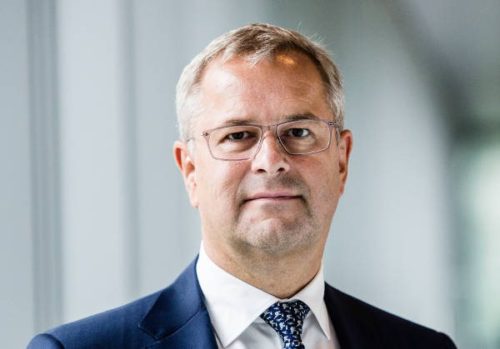
A.P. Møller – Mærsk made good progress on its transformation in the first quarter of 2019 as its increased earnings and strengthened its balance sheet.
Maersk closed the first quarter of 2019 with a 33% increase in earnings before interest, tax, depreciation and amortization (EBITDA), which reached USD1.2 billion in the period, while revenue grew by 2.5% to USD9.5 billion compared to the first quarter of 2018.
The Danish shipping major’s underlying loss from continuing operations stood at USD69 million, shrinking from a loss of USD329 million reported in the same period a year earlier.
Operating cash flow improved to USD1.5 billion and free cash flow was USD3.5 billion, including sale of shares in Total S.A.
“We had a good start to 2019,” the CEO of A.P. Moller–Maersk, Søren Skou, said.
Skou said the group has significantly strengthened its balance sheet.
Profitability in the company’s Ocean sector increased. EBITDA grew 42% to USD927 million compared to same period last year, mainly driven by a 3.9% increase in average loaded freight rates and an improvement in total operating cost of 2.8%. Revenue increased to USD6.9 billion despite lower volumes which declined 2.2%, impacted by the frontloading seen on the Pacific trades in the fourth quarter of 2018 and weak demand on Latin America and Oceania trades.
Looking at terminal profitability, the opening of the Moin terminal, Costa Rica and positive underlying volume growth in gateway terminals had a positive impact on terminal profitability in the first quarter of the year. Terminals & Towage reported an increase in revenue to USD 991 million from USD911 million and in EBITDA to USD267 million from USD244 million compared to same quarter last year.
Maersk delivered combined synergies of USD130 million from its strategic transformation in the first quarter. Cash return on invested capital (CROIC) improved to a positive 6.7% from a negative 5.9%, driven by higher earnings, strong cash conversion and a reduction in invested capital.
“We made good progress on the transformation, where we have completed the separation of the energy businesses, further integrated our organisation and continued to improve our product portfolio. This resulted in a solid cash return on invested capital and delivery of synergies, getting us closer to our target of USD 1 billion by end of 2019,” Skou further stated.
Furthermore, as part of the intention to distribute a material part of the value of shares received in Total S.A in connection with the sale of Maersk Oil, Maersk’s Board of Directors has decided to exercise the authority to buy back shares with a maximum value of DKK10 billion (USD1.5 billion).
The program will run from June 2019 and over a period of up to 15 months. After execution of the program, the Board of Directors will evaluate the capital structure and outlook for A.P. Moller – Maersk with the intention to distribute additional cash to shareholders, subject to maintaining investment-grade rating.
Looking forward, Maersk reiterated its guidance of an EBITDA of around USD5 billion, including effects from IFRS 16.
“We reaffirm our guidance for the 2019 results. We are still facing considerable uncertainties from weaker macro numbers as well as the risk from trade tensions and implementation of IMO 2020. In Q1, volumes on trans-Pacific trade between Asia and North America have shown signs of decline and new tariffs can potentially reduce expected growth in global container volumes by up to 1 percentage point,” Skou added.